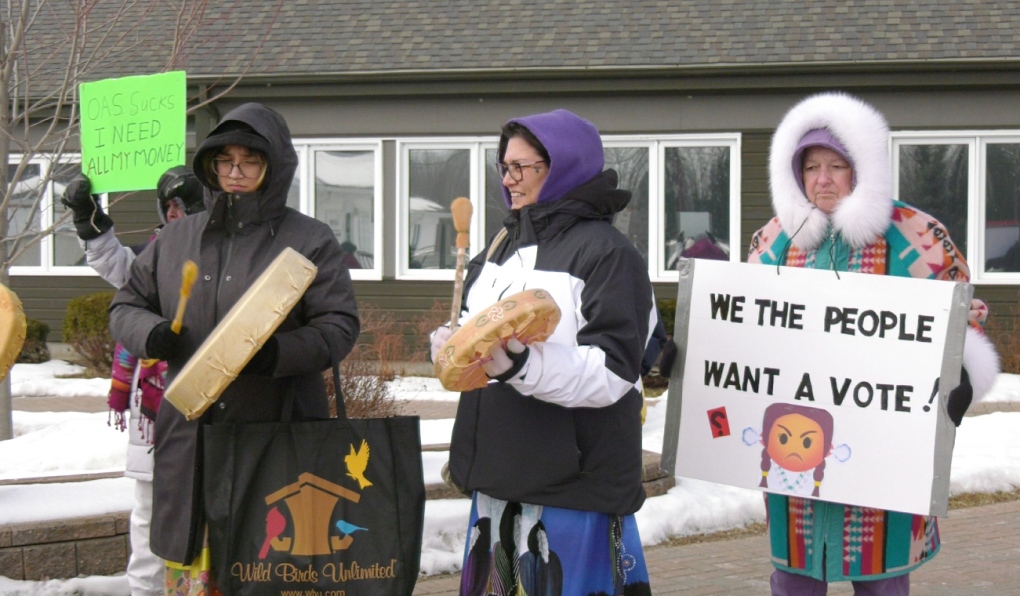Nipissing First Nation members protest plan to distribute Robinson Huron treaty funds
A vote in April will decide how much money from the Robinson Huron Treaty settlement will remain with the Nipissing First Nation and how much will be distributed to members.
But not everyone is happy with the plan. A group of about 40 First Nations people demonstrated outside of the band office on Semo Road on Monday, expressing their concerns about how the First Nation is distributing the money.
Frustrated with their chief and council, the protesters said they are upset about what they call a lack of “transparency and accountability.”
“How can they sign a settlement agreement without any of the members not knowing anything about it?” said demonstrator Jan Couchie.
The protestors worry the money won’t be fairly or evenly distributed.
“When it pertains to anything treaty rights, the membership has the right to know,” Couchie said.
“We have it in our constitution on our NFN that we are to be notified and we were not notified.”
 A group of about 40 First Nations people demonstrated outside of the band office on Semo Road on Monday, expressing their concerns about how the First Nation is distributing money from the settlement. (Eric Taschner/CTV News)
A group of about 40 First Nations people demonstrated outside of the band office on Semo Road on Monday, expressing their concerns about how the First Nation is distributing money from the settlement. (Eric Taschner/CTV News)
Each First Nation has the option to disperse its share of the settlement however it sees fit.
“We didn’t have that option,” Couchie said. “That option was taken away from.”
She was referring to a Nipissing First Nation council decision to take money from the cheques of each First Nations member to support what the group describes as a community “legacy project.”
A vote is coming up in a few weeks to determine how much money is going to go to members and how much will be used for the project. There are two choices currently on the ballot: 25 per cent will stay with the First Nation or 35 per cent.
'Doesn't seem fair'
“That doesn’t seem fair to me. We don’t even know 25 per cent of what,” Couchie said.
The group is calling on council and Chief Scott McLeod to reconsider by adding a third voting option where each individual can choose how much they want to put in the pot, if any at all.
For his part, McLeod said the argument that individuals are giving up money is backward. That argument was made in court.
“It’s not all individual money. We signed the treaty as a nation,” McLeod said.
“There are no individual signatures. It’s the nation’s money going to the individual.”
Last June, the federal and provincial governments reached a historic $10 billion settlement with the Robinson Huron Treaty Litigation Fund, representing the 21 Robinson Huron First Nations.
The proposed settlement is to resolve claims related to past annuities, compensation that should have been paid for the past 170 years since the treaty was signed in 1850.
The settlement includes $5 billion from Canada and $5 billion from Ontario to be paid to all 21 First Nations included in the Treaty.
The amount each First Nation will receive has not yet been determined.
“We have to uphold the spirit and the intent of the treaty,” McLeod said.
Couchie said she expects most people will choose the lower option during the voting process.
CTVNews.ca Top Stories

Watch Live Now: Canadian analysis ahead of the CNN Presidential Debate
U.S. President Joe Biden and former president Donald Trump are set to go head-to-head tonight in the first of two planned presidential debates. Here's how to watch the CNN Presidential Debate, Power Play's pre- and post-debate specials, and follow along in our real-time CTVNews.ca live expert analysis and commentary by debate and body-language experts.
'Hanging on for her life': Sask. family desperate to bring home sick niece from Philippines
For half a decade, a Saskatoon family has been trying to bring their orphaned niece to Canada, they say now it’s a matter of life or death.
'No additional flights will be cancelled': WestJet avoids strike as feds order binding arbitration
A potential strike by WestJet airplane mechanics would upend travel plans for 250,000 customers over the Canada Day long weekend, the airline says — and cost it millions of dollars.
BREAKING Nunavut judge sentences Toronto woman to 3 years prison for Inuit identity fraud
A Nunavut judge has sentenced a Toronto woman to three years in prison in a case of Inuit identity fraud.
Canada's top court rejects appeal from Sask. man who murdered wife
The Supreme Court of Canada has rejected an application from a Saskatoon man who murdered his wife.
Where do new Canadians come from? India and Philippines take top spots
Canada has welcomed more than 3.9 million new citizens since 2005, with nearly one third coming from India, the Philippines or China, according to a CTVNews.ca analysis.
Marilyn Monroe's former Los Angeles home declared a historic monument to save it from demolition
Fans of Marilyn Monroe have won a battle to preserve her mark on Los Angeles and are a step closer to seeing a towering statue of the silver screen icon remain in Palm Springs.
Man charged with threatening to kill presidential candidates found dead as jury was deciding verdict
A New Hampshire man charged with threatening the lives of presidential candidates last year has been found dead while a jury was deciding his verdict, according to court filings Thursday.
AI regulation 'a start,' needs to 'have teeth': Hinton, godfather of AI, says
So-called godfather of AI Geoffrey Hinton says he's 'pleased' governments are starting to take artificial intelligence, and the possible regulations of it, seriously.

































